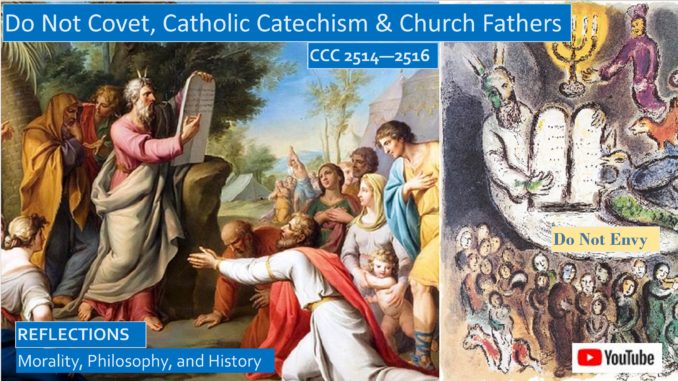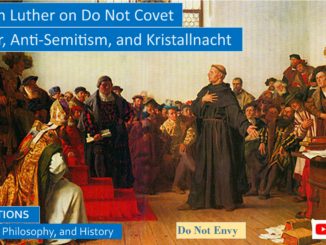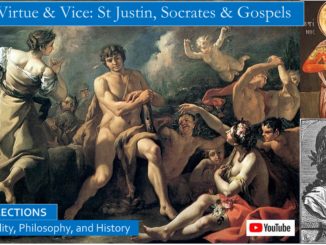
The Catechism starts its discussion of the sin of envy:
CCC 2514 “St. John distinguishes three kinds of covetousness or concupiscence: lust of the flesh, lust of the eyes, and pride of life (1 John 2:16). In the Catholic catechetical tradition, the ninth commandment forbids carnal concupiscence; the tenth forbids coveting another’s goods.”
What is pride of life? That is the preponderant translation from the Greek, including NIV, KJV, NKJV, and RSV, but other versions translate this as pride in one’s possessions, boasting about material possessions, vainglory of life, which is less clear, pride in one’s lifestyle, and arrogance of material possessions. This recalls the advice we hear from the monastic Desert Church Fathers that we should shed our attachment to our possessions as a first step to defeating the envy in our souls.
What is concupiscence?
CCC 2515 “Concupiscence can refer to any intense form of human desire. Christian theology has given it a particular meaning: the movement of the sensitive appetite contrary to the operation of the human reason. St. Paul identifies it with the rebellion of the ‘flesh’ against the ‘spirit.’” (Gal 5:16, 17, 24; Eph 2:3)
St Thomas Aquinas defines the sensitive appetite as relating to our passions, allowing our feelings to rule our minds, with no efforts to exercise self-discipline.
Surprisingly, the Catholic Catechism discusses concupiscence not when reflecting on the commandment prohibiting adultery but on the commandment forbidding coveting your neighbor’s wife. Concupiscence is not itself a sin, and although it is commonly thought of as a sexual sin, it can “refer to any intense form of human desire.” Further quoting from CCC 2515: “Concupiscence stems from the disobedience of the first sin. It unsettles man’s moral faculties and, without being in itself an offense, inclines man to commit sins.”[1] The Catholic Catechism footnotes the decrees of the Council of Trent, which teaches that “concupiscence or the tinder of sin remains in the baptized. Since it is left for us to wrestle with, it cannot harm those who do not consent but manfully resist it by the grace of Jesus Christ.” This decree of Trent then confirms that concupiscence is not sin itself, but inclines us to sin.[2]
Please read our other blogs on the Catholic Catechism on DO NOT ENVY:
Catholic Catechism, Do Not Envy, Purification of the Heart, CCC 2517-2527, https://wp.me/pachSU-eb
Catholic Catechism, Thou Shalt Not Covet thy Neighbors Possessions, CCC 2534-2540, https://wp.me/pachSU-eq
Catholic Catechism, Thou Shalt Not Covet thy Neighbors Possessions, CCC 2541-2557, https://wp.me/pachSU-fx
Please view our YouTube Videos on DO NOT ENVY your neighbor’s wife: https://youtu.be/vhte2s1ITNU and https://youtu.be/v_BmOU1VcHQ
Please view our YouTube Video on DO NOT ENVY your neighbor’s possessions: https://youtu.be/8QHrtKGDzKM
Before we study the Catechism’s teaching, I would like to share some practical advice I picked up in one of the popular books on divorce and relationships in decades past, alas, I cannot locate the title, if you know the book please tell us the title. The book had many case studies on how marriages slipped into divorce, and in the majority of these stories the aggrieved husband had a good female friend at work, and he would complain to her about the lack of affection he was shown at home. We all have concupiscence in our soul, the idea gets implanted in our hearts and minds, and often many months later in a moment of weakness concupiscence is more fully realized, and multiple relationships are changed forever, intimacy can be forgive, but intimacy cannot be walked back.
In the introduction to the commandment against envy, the Catholic Catechism quotes Jesus, “Everyone who looks at a woman with lust has already committed adultery with her in his heart.[3]
We can see the sin of envy in the first primordial murder of Abel by his brother Cain. The Lord noticed that Cain was angry at his brother Abel, for the Lord accepted Abel’s offering, but not Cain’s offering. The Lord said to Cain, “Why are you angry, and why has your countenance fallen? If you do well, will you not be accepted? And if you do not do well, sin is lurking at the door; its desire is for you, but you must master it.”[4] This first murder, festering from this first coveting, this coveting not of physical possessions, for there were few physical possessions in these early days, no, this coveting was the most precious possession of all, the pleasing of the Lord. None of us are immune, sin lurks everywhere, lock the front doors of the church and it will creep in under the back doors like a snake, everything can be coveted.
Even monks, who own nothing, who surrender all their possessions to live in poverty, even monks need to guard against covetousness and envy, even monks need to guard against the covetousness of Cain, who like a monk owned little. This also holds true for us, none of us are immune to envy and covetousness, especially if we are convinced of our righteousness.
St Maximus the Confessor teaches us that “the mark of monastic self-esteem is to be puffed up about one’s virtue and its consequences. The mark of monastic pride is to be conceited about one’s own achievements, to ascribe these achievements to oneself and not to God, and to hold others in contempt. The mark of worldly self-esteem and pride is to be puffed up and conceited about one’s beauty, wealth, power and moral judgment.”[5]
Wrestling with sin, wrestling with concupiscence, did Jacob wrestle with these when he wrestled the strong stranger during the night, when he wrestled with the angel? Alone, Jacob wrestled with the angel, the angel whom St Augustine and other church fathers taught was the pre-incarnate Christ, Christ both God and man.
We read in Genesis: Jacob was left alone; and a man wrestled with him until daybreak. When the man saw that he did not prevail against Jacob, he struck him on the hip socket; and Jacob’s hip was put out of joint as he wrestled with him. Then he said, “Let me go, for the day is breaking.” But Jacob said, “I will not let you go, unless you bless me.” So he said to him, “What is your name?” And he said, “Jacob.” Then the man said, “You shall no longer be called Jacob, but Israel, for you have striven with God and with humans, and have prevailed.”[6]
Jacob was like Cain, Jacob envied his elder brother Esau’s birthright, his blessing. This was Esau’s most prized possession, and he deceived his brother into selling it for a bowl of porridge, and he and Rachel deceived his father into blessing Jacob as he meant to bless Esau. Abraham had sent his servant with a camel laden with gifts to his brother Laban to fetch a wife for Jacob’s father Isaac, but like Cain, Jacob fled into exile across the desert, arriving at the tent of Laban with only the clothes on his back. For seven years once, and for seven years twice he labored as a servant for Laban for the hand of his daughter Rachel, but those seven years were but as a day, so great was Jacob’s love for Rachel.
God blessed Laban as He blessed Jacob, and after the fourteen years had passed Jacob returned home to face and hopefully reconcile himself with his chieftain brother, head of his own clan of herders and warriors. Ahead he sent his two wives, Rachel and Leah, and his two handmaidens, and his twelve children, fathers of the twelve tribes of Israel, and his flocks the portion of his flocks as gifts for Esau. Everyone else crossed the stream, Jacob lingered behind, apprehensive, that was the night he fought the angel, the angel who put his thigh out of joint, the angel who blessed him, the angel whom he prevailed against, the angel who made him lame the rest of his life.
St Augustine asks, “What does this mean, Jacob wresting with the angel and refusing to let go?” Like Jacob, we should “struggle, wrestle, to hold on to Christ, to love your enemy. You hold onto Christ here and now when you love your enemy.” “How is Jacob blessed? Jacob got the upper hand with God, Jacob held on bravely and persevered and did not lose from his grasp what Adam lost. So let us, the faithful, hold on to what we receive, in order that we may deserve to be blessed.”
St Ephrem the Syrian teaches that when Jacob wrestled with the angel he “learned both how weak he was and how strong he was. Jacob was weak when the angel touched and dislocated his thigh bone, and Jacob was strong for the angel said to him, ‘Let me go.’ It was to show how long they were contending that the angel said, ‘Behold, the dawn is rising.’ Then Jacob sought to be blessed in order to make known that it was in love that they had laid hold of each other. Then the angel blessed him to show that he was not angry that an earthly being had prevailed over him.”[7]
POPE JOHN PAUL II EVANGELICAL LETTER, LORD AND GIVER OF LIFE
CCC 2516 “Because man is a composite being, spirit and body, there already exists a certain tension in him; a certain struggle of tendencies between ‘spirit’ and ‘flesh’ develops. But in fact, this struggle belongs to the heritage of sin. It is a consequence of sin and at the same time a confirmation of it. It is part of the daily experience of the spiritual battle.”
Here the Catechism quotes from Pope John Paul II’s evangelical letter on the Holy Spirit to our struggle with concupiscence: “For the Apostle it is not a matter of despising and condemning the body which with the spiritual soul constitutes man’s nature and personal subjectivity. Rather, he is concerned with the morally good or bad works, or better, the permanent dispositions – virtues and vices – which are the fruit of submission (in the first case) or of resistance (in the second case) to the saving action of the Holy Spirit. For this reason, the Apostle writes: ‘If we live by the Spirit, let us also walk by the Spirit.’”
We have found a wonderful summary of his evangelical letters, “The Legacy of Pope John Paul II.” The Pope does not get into a theological discussion of the nature of the Holy Spirit or the filioque, but rather this is more of a pastoral letter exploring how the Holy Spirit can live in our hearts and enrich our souls if we but accept the gift of His holy presence. Through Baptism the Holy Spirit dwells in our souls. The key text of this encyclical[8] is John 16:8: “When the Lord comes, he will prove the world wrong about sin and righteousness and judgment.”[9]
As Jacob wrestles with the angel, so St Paul in Galatians speaks of the flesh wrestling with the spirit: “If we live by the Spirit, let us also be guided by the Spirit.”[10] Here the Catechism references John Paul’s letter on the Holy Spirit, where our virtues wrestle with our vices, where the desires of our flesh wrestle with desires of the Spirit. Do we enjoy virtues, do we submit to the saving grace of the Holy Spirit, or are we conquered by our vices, resisting the saving actions of the Holy Spirit? This struggle of the sprit and the flesh is a struggle between good and evil, between the moral and the vile, between life and death, between a life truly lived and a life merely wasted.
St Paul exhorts that a life lived in selfish sin yields naught but “enmity, strife, jealousy, anger, selfishness, dissension, party spirit, envy,” not a life but rather a rotting of the soul. But a life lived in the spirit is a life blooming with the fruits of the Spirit, “love, joy, peace, patience, kindness, goodness, faithfulness, gentleness, self-control,” a life of peace of heart and upright conscience. Pope John Paul II asks us, “Who will win? The one who welcomes the gift.”[11]
Temptation is not a sin, temptation we should constantly wrestle, for nursed temptations breeds covetousness. Covetousness is a sin of the soul, covetousness breeds addiction, addiction that leads to all other sins, selfishness that leads to hatefulness, murder, theft, deceit, adultery.
Jacob in the night, Israel in the morning, marveled that he had seen God face to face, and yet he lived. Not even Moses saw the face of God, Uzza only touched the Ark of the Covenant, Uzza did not live. Why did Jacob live? Why did Cain live? This is not the end of the story of Jacob, this is not the end of the story of Israel, the Jacob-Joseph saga has many more cycles of deception and redemption and forgiveness and growth in the Spirit for the remainder of the Book of Genesis.
Why did Jacob live? St John Chrysostom asks, “Do you see how much confidence Jacob gained from the vision he had?” “Do you see how the Lord shows consideration for our human limitations in all he does and in arranging everything is a way that gives evidence of his characteristic love?”[12] God and the angel knew how to encourage Jacob in his walk with the Lord, to encourage him to walk a little bit further down the road.
Jacob was encouraged that morning to face his shame, to face the consequences of his deceit long ago, to face his brother Esau, not knowing whether he would be welcome or whether he would be struck dead in the middle of the desert.
Esau with his band of four hundred men did not chase him to kill him. Instead, “Esau ran to meet him, and embraced him, and fell on his neck and kissed him, and they wept.’ When Esau looked up and saw the women and children, he said, ‘Who are these with you?’ Jacob said, ‘The children whom God has graciously given your servant.’ Then the maids drew near, they and their children, and bowed down; Leah likewise and her children drew near and bowed down; and finally Joseph and Rachel drew near, and they bowed down. Esau said, ‘What do you mean by all this company (and gifts) that I met?” Jacob answered, ‘To find favor with my lord.’ But Esau said, ‘I have enough, my brother; keep what you have for yourself.’ Jacob said, ‘No, please; if I find favor with you, then accept my present from my hand; for truly to see your face is like seeing the face of God—since you have received me with such favor. Please accept my gift that is brought to you, because God has dealt graciously with me, and because I have everything I want.’ “[13]
Like Jacob, when we have wronged our brother, and repent, and offer recompense, and reconcile with our brother, and look into his face, we will also see the face of God.
[1] Catechism of the Catholic Church, 2nd Edition (Washington DC: US Catholic Conference: 1994), p. 602, paragraph 2515, and https://www.usccb.org/sites/default/files/flipbooks/catechism/604/index.html
[2] “Denzinger Compendium of Creeds, Definitions, and Declarations on Matters of Faith and Morals”, 43rd Edition, “Council of Trent Decrees, various translators (San Francisco: Ignatius Press, translated 2012), p. 373, paragraph 1515.
[3] https://www.biblegateway.com/passage/?search=Matthew+5%3A28&version=NRSVCE
[4] https://www.biblegateway.com/passage/?search=genesis+4%3A6&version=NRSVCE
[5] St Maximus, “Third Century on Love,” In the Philokalia, The Complete Text, compiled by St Nikodimos of the Holy Mountain and St Makarios of Corinth, Vol. 2, translated and edited by GEH Palmer, Phillip Sherrard, and Kallistos Ware (London: Faber and Faber, 1981), p. 96, chapter 84.
[6] https://www.biblegateway.com/passage/?search=genesis+32%3A24-28&version=NRSVCE
[7] St Augustine and St Ephrem on Genesis 32, in Ancient Christian Commentary on Scripture, Old Testament II, Genesis, various translators (Downers Grove, Illinois: InterVarsity Press, 2002), pp. 218-223.
[8]Alan Schreck, “The Legacy of Pope John Paul II, The Central Teaching of His Fourteen Encyclical Letters,” (Steubenville, Ohio: Emmaus Road Publishing, 2012), pp. 39-47.
[9] https://www.biblegateway.com/passage/?search=john+16%3A8&version=NRSVCE
[10] https://www.biblegateway.com/passage/?search=galatians+5%3A25&version=NRSVCE
[11] http://w2.vatican.va/content/john-paul-ii/en/encyclicals/documents/hf_jp-ii_enc_18051986_dominum-et-vivificantem.html : section 55.
[12] St John Chrysostom on Genesis 32, in Ancient Christian Commentary on Scripture, Old Testament II, Genesis, p.-223.
[13] https://www.biblegateway.com/passage/?search=genesis+33%3A4-11&version=NRSVCE




1 Trackback / Pingback